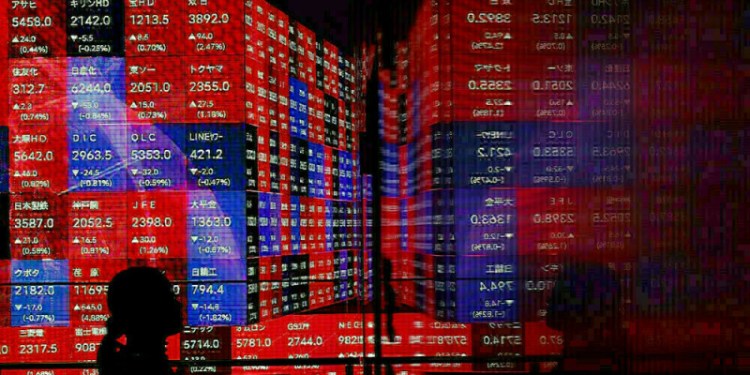© Reuters. A man wearing a protective mask, amid the coronavirus disease (COVID-19) outbreak, walks past an electronic board displaying Shanghai Composite index, Nikkei index and Dow Jones Industrial Average outside a brokerage in Tokyo, Japan, March 7, 2022. REUTER
By Tom Westbrook
SINGAPORE (Reuters) – Stocks steadied in Asia on Wednesday as Shanghai emerged blinking from two months of lockdown and a dip in oil prices dangled the prospect of a respite from rising energy prices, but nerves about inflation kept investors and bond markets on edge.
Soaring food and energy costs drove eurozone inflation to a record-high 8.1% in May, overnight data showed, beating market expectations and stoking concern about rate rises not just in Europe but globally.
Two-year German bund yields hit their highest in over a decade as investors sold out. Benchmark 10-year Treasury yields rose 10 basis points (bps) and were up a further 2.5 bps to 2.8749% early in the Asia session. [US/]
MSCI’s broadest index of Asia-Pacific shares outside Japan fell 0.1% and Japan’s Nikkei rose 0.5%.
S&P 500 futures bounced 0.5% after the index slid 0.6% on Tuesday. The U.S. dollar, meanwhile, has steadied after sliding in the second half of May and it rose slightly against the euro and the yen in early trade on Wednesday. [FRX/]
The U.S. Federal Reserve begins shrinking assets holdings built up during the pandemic on Wednesday and traders expect it will raise rates by 50 bps at meetings this month and next.
“Markets are pricing in rate hikes in June from the UK, U.S., Sweden, Australia and Canada,” said Societe Generale (OTC:SCGLY) analyst Kit Juckes.
“The more the markets focus on the inflation data and central bank action, the more likely it is that we have a bumpy start to the summer in risk sentiment and a strong one for the dollar.”
The Bank of Canada is expected to raise its benchmark target rate 50 bps to 1.5% when it meets later in the day.
Australian economic growth slowed in the first quarter, data showed on Wednesday, but domestic demand helped it come in a bit better than expected, setting the scene for more hikes in interest rates.
POSITIVES
A little relief from an overnight pullback in oil prices and hope that China’s slowdown might be nearing its nadir have helped to check investors’ worries.
Following two months of frustration, despair and economic loss, a draconian lockdown of Shanghai’s 25 million residents ended at midnight.
Small groups in the city’s former French Concession whistled and shouted “ban lifted”.
Chinese factory activity data for May, released on Tuesday, wasn’t as bad as traders feared either and showed the pace of contraction had slowed down.
“Compared to a couple of weeks ago it is a clear positive for sentiment,” said Westpac analyst Sean Callow, adding, however, that inflation was among other “clear negatives”.
Stocks in Hong Kong and Shanghai hung on to Tuesday gains and opened steady.
Currency markets were in a cautious mood and the dollar’s three-week decline has paused. It stood at a two-week high of 128.18 yen on Wednesday and rose 0.2% to $1.0709 per euro. The Aussie hovered at $0.7172. [AUD/]
Oil prices fell on Tuesday after the Wall Street Journal reported that oil producing nations were considering excluding Russia from a production deal, paving the way for middle eastern countries to increase output.
Brent crude futures retreated from an almost three-month high after the report and were last steady at $116.18 a barrel.
The stronger dollar pushed spot gold a fraction lower to $1,834 an ounce. Bitcoin clung to early-week gains at $31,838.
Source: Investing.com




























